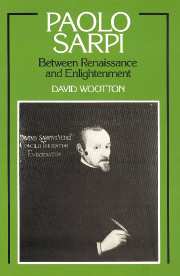Book contents
- Frontmatter
- Contents
- List of illustrations
- Acknowledgments
- Introduction
- Sarpi's life: a brief survey
- Chapter 1 The Pensieri filosofici
- Chapter 2 Sarpi and the Venetian Interdict
- Chapter 3 Sarpi's place in Europe
- Chapter 4 The man and his masks
- Appendix: The testimony of Giovanni Francesco Graziani (1610)
- Notes on illustrations
- Notes
- Bibliography
- Index
Chapter 4 - The man and his masks
Published online by Cambridge University Press: 27 October 2009
- Frontmatter
- Contents
- List of illustrations
- Acknowledgments
- Introduction
- Sarpi's life: a brief survey
- Chapter 1 The Pensieri filosofici
- Chapter 2 Sarpi and the Venetian Interdict
- Chapter 3 Sarpi's place in Europe
- Chapter 4 The man and his masks
- Appendix: The testimony of Giovanni Francesco Graziani (1610)
- Notes on illustrations
- Notes
- Bibliography
- Index
Summary
A gross error it is, to think that regal power ought to serve for the good of the body, and [not] of the soul; for men's temporal peace, and not for their eternal safety: as if God had ordained kings for no other end and purpose but only to fat up men like hogs and to see that they have their mast?
(R. Hooker, Of the Laws of Ecclesiastical Polity, bk VIII: written C. 1593; 1st edn, London, 1645)Stimò sempre la Republica di Venezia che il fondamento principale d'ogni imperio e dominio fosse la vera religione e pietà, et ha conosciuto per grazia singolare di Dio l'esser nata, educata et accresciuta nel vero culto divino.
(Paolo Sarpi, Considerazioni sopra le censure della santità di Papa Paulo V contro la serenissima Republica di Venezia, Venice, 1606)(The Venetian Republic has always held that the most important support for all government and authority comes from true religion and piety. By singular grace of God Venice was born, educated and has developed to the present day in the practice of the true worship of God.)
Images of the man
Ego eius ingenii sum, ut, velut Chamalaeon, a conversantibus mores sumam; versum, quos ab occultis, et tristibus haurio, invitus incordio: hilares et apertos sponte ac libere recipio: personam coactus fero, licet in Italia nemo sine ea esse possit.
(Letter to Gillot, 12 May 1609)- Type
- Chapter
- Information
- Paolo SarpiBetween Renaissance and Enlightenment, pp. 118 - 135Publisher: Cambridge University PressPrint publication year: 1983

